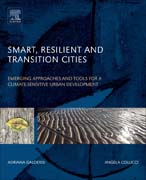
Smart, Resilient and Transition Cities: Emerging Approaches and Tools for A Climate-Sensitive Urban Development
Galderisi, Adriana
Colucci, Angela
Smart, Resilient and Transition Cities: Emerging Approaches and Tools for Climate-Sensitive Urban Development starts with a presentation of the three widespread urban examples, which are gaining increasing attention from urban planners and decision-makers. The authors then go on to assess approaches to climate issues, highlighting the crucial role of cities and providing an overview of the numerous strategies and initiatives promoted by the European Union (guidelines, platforms, networks, research projects, etc.) to counterbalance climate change. The positive and negative aspects of current practices are highlighted, addressing mitigation and/or adaptation issues undertaken by the EU cities. The reader is also provided with an overview of bottom-up initiatives and practices promoted by local stakeholders' partnerships and addressed to enhance urban resilience in the face of climate change. The book concludes with an informative discussion on the lessons learnt from the case studies and provides guidelines for developing an integrated climate strategy, capable to guide planners and decision makers towards a climate sensitive urban development Smart, Resilient and Transition Cities: Emerging Approaches and Tools for Climate-Sensitive Urban Development merges a scientific approach with a pragmatic one. Through this approach the authors explore the strengths and weaknesses of formal and informal practices to foreshadow innovative paths for an adaptive process of urban governance in the face of climate change. The book guides the reader along new governance paths, characterized by continuous learning and close cooperation and communication among different actors and stakeholders and so helps them to overcome current segregated approaches to climate issues. Provides a framework for the necessary links between resilience, smart growth, low-carbon urbanism, climate-friendly cities and transition cities, all of which is highly needed when examining climate policyFocuses on the governance processes and lessons learned, leading to an increased visibility and viability of these sustainability initiativesIncludes case studies which provide practical examples about how cities can plan for and adapt to the Includes case studies which provide practical examples illustrating how cities can plan for and adapt to the consequences of global climate change INDICE: 1. The Smart City Metaphor to Foster Collaborative and Adaptive Decision-Making Processes in the Face of Climate Issues 2. The Resilient City Metaphor to Enhance Cities' Capabilities in the Face of Complexities and Uncertainties Arising from Current and Future Climate Scenarios 3. The Transition Approach in Urban Innovations: Local Responses to Climate Change 4. Smart, Resilient and Transition Cities: Commonalities and Peculiarities of Current Urban Metaphors 5. European Strategies and Initiatives to Tackle Climate Change: Towards an Integrated Approach 6. The American Approach to Climate Change: a General Overview and a Focus on Northern and Artic Regions 7. Climate Change Mitigation and Adaptation Initiatives in Africa: the Case of the CDKN Working with Informality to Build Resilience tn African Cities Project 8. Addressing Climate Change in China: Policies and Governance 9. Mitigation and Adaptation Strategies in the Face of Climate Change: the Australian Approach 10. European Cities Addressing Climate Change 11. Adaptation and Spatial Planning Responses to Climate Change Impacts in UK: the Case Study of Portsmouth 12. Land-Use Planning and Climate Change Impacts on Coastal Urban Regions: the Cases of Rostock and Riga 13. Importance of Multi Sector Collaboration in Dealing With Climate Change. The Case of Belgrade 14. Genoa and Climate Change: Policies and Adaptation 15. The Evolution of Flooding Resilience: the Case of Barcelona 16. Athens Facing Climate Change: How Low Perceptions and the Economic Crisis Cancel Institutional Efforts 17. Sustainability of Climate Policy at Local Level: the Case of Gaziantep City 18. Towards Integration: Managing the Divergence between National Climate Change Policies and Urban Planning in Ghana 19. Spatial Planning for Climate Adaptation and Flood Risk: Interpretation of the Sponge City Program in Guangzhou, China. 20. Climate Change and Australian Local Governments: Adaptation between Strategic Planning and Challenges in Newcastle (NSW) 21. Transition Initiatives: Three Exploration Paths 22. Transition Towns Network in United Kingdom: the Case of Totnes 23. Transition Towns Network in Italy: the Case of Monteveglio 24. Model for Integrated Urban Disaster Risk Management at the Local Level: Bottom-Up Initiatives of Academics 25. Enhancing Community Resilience in Barcelona: Addressing Climate Change and Social Justice Through Spaces of Co-Management 26. Barriers to Societal Response and a Strategic Action Plan Towards Climate Change Adaptation and Urban Resilience in Turkey 27. Victims or Survivors: Resilience from the Slum Dwellers Perspective in India 28. Just Transition Discourse in Newcastle: Opportunities and Barriers 29. Integrated knowledge in Climate Change Adaptation and Risk Mitigation to Support Land Use and Spatial Planning 30. Boundaries, Overlaps and Conflicts between DRR and Adaptation to CC. Are there Prospects of Integration? 31. The Contribution of the Economic Thinking to Innovate Disaster Risk Reduction Policies and Action 32. Flood Resilient Districts: Integrating Expert and Community Knowledge in Genoa 33. Drawing Lessons from Experience 34. Future Perspectives
- ISBN: 978-0-12-811477-3
- Editorial: Elsevier
- Encuadernacion: Rústica
- Páginas: 200
- Fecha Publicación: 01/08/2018
- Nº Volúmenes: 1
- Idioma: Inglés
